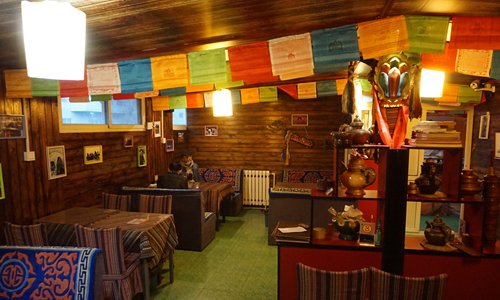
Tsangyang Gyatso has become a meeting spot for Tibetan students in Beijing. (Photo/Courtesy of Hwang Hyerin)
More than just food
In addition to a traditional feast, a particular feature of many Tibetan restaurants in Beijing is their passion for offering an experience of Tibetan culture that goes beyond food.
For 24-year-old Gen Nang, Tibetan restaurant owners in Beijing have a responsibility to do more than just satisfy cravings. Nang is a native of Yushu Tibetan Autonomous Prefecture, in Qinghai, and he launched his restaurant Tsangyang Gyatso in Haidian district in 2015. He feels a responsibility as a representative of the Tibetan people to leave his clients with a lasting positive impression.
"We welcome Han people here and serve them our local specialty food, and our priority is to make sure they are satisfied and leave with a good image of Tibetans," he told Metropolitan. "The meat comes directly from Qinghai, because we want to offer only the best products to our customers."
In addition to food quality, Nang spared no efforts to recreate the cozy and warm feeling of his native Yushu in China's capital, delighting his customers with a visual feast. Refusing to settle for less than authenticity, he shipped prayer flags, yak skulls, carpets and various art objects directly from Qinghai.
Tsangyang Gyatso quickly became a favorite spot of both Tibetan and Han students from nearby universities looking to relax. Liu Tianqi, a regular customer from Henan Province, told Metropolitan, "It's quite amazing that we can have this kind of experience in Beijing. I study next door, and entering the restaurant is like stepping into another world."
Nang is a musician and likes to delight his guests with Tibetan folk songs. "When the restaurant is full, I like to play the guitar for my guests so they can both taste and listen to the 'Qingzang Gaoyuan,'" he said.
Cultural discovery
Although it was not part of his initial plan, Wangqing quickly realized the enormous potential food culture has to help explore and foster understanding between local Beijingers and Tibetan people.
"Makye Ame is a bearer of the Tibetan food culture, and our restaurant constantly seeks to showcase and promote Tibetan culture. Our goal is to make it possible for more tourists, both domestic and foreign, to experience and get a better understanding of Tibetan culture," he said.
Christopher St-Cavish, former cook and now food writer based in China, believes engaging in foreign culinary experiences can be an occasion for people to open their minds to other cultures.
"Cuisine can be a great diplomat," he said. "It sure seems easier to like a country and its people when you genuinely like their food."
Love of food has the power to overcome cultural boundaries, and enjoying an exotic dish at an ethnic-food restaurant can be the first step toward fostering respect for different cultures, which is a fundamental aspect of a multicultural society.
St-Cavish recalls growing up in a suburb of Miami where the most exotic thing available was Thai food.
"It was really rather poor Thai food, but the promise it held out for discovering a whole new world was quite powerful," he said.
This was his first step on a journey that would eventually bring him to Thailand and then on to China, proving that food can be a launch pad for discovering hidden opportunities.
This echoes the ideas of Krishnendu Ray, associate professor of food studies at New York University, in his book The Ethnic Restaurateur. Ray is a strong advocate of the idea that culinary experiences can build a bridge between cultures. "Eating another culture's food is probably the easiest thing you can do to engage with that culture," he said.
However, these exchanges are not spontaneous and require some effort on the part of the client. For real and meaningful cultural discoveries to take place, he suggests that customers should slow down, soak in the atmosphere and enjoy their experience.
"Foodie culture now is all about a competition to find the next best place, but that anxiety gets in the way of really engaging with cultural difference. Talk to the people who are serving you, the people behind the counter, the people who are cooking and see if you can have a conversation," Ray said.
These kinds of cultural exchanges are not just abstract ideas for Lhamo; it is part of her daily job at Makye Ame.
"Some people cannot go to Tibet, for lack of time or money, here they can appreciate Tibetan dishes and Tibetan culture without leaving Beijing," Lhamo said. "We try to let them go back home with a little bit of Tibet in their hearts."


















































